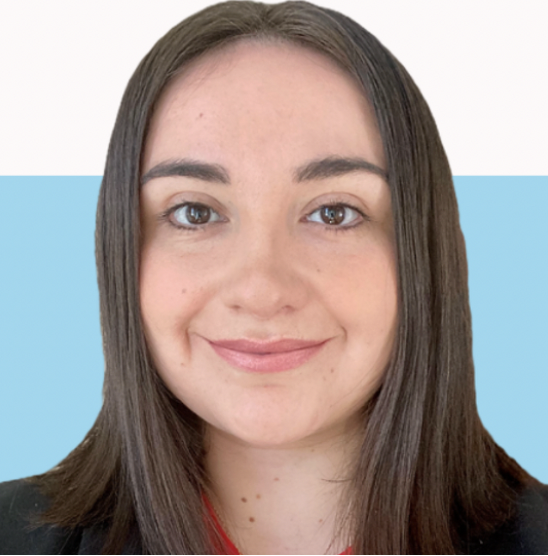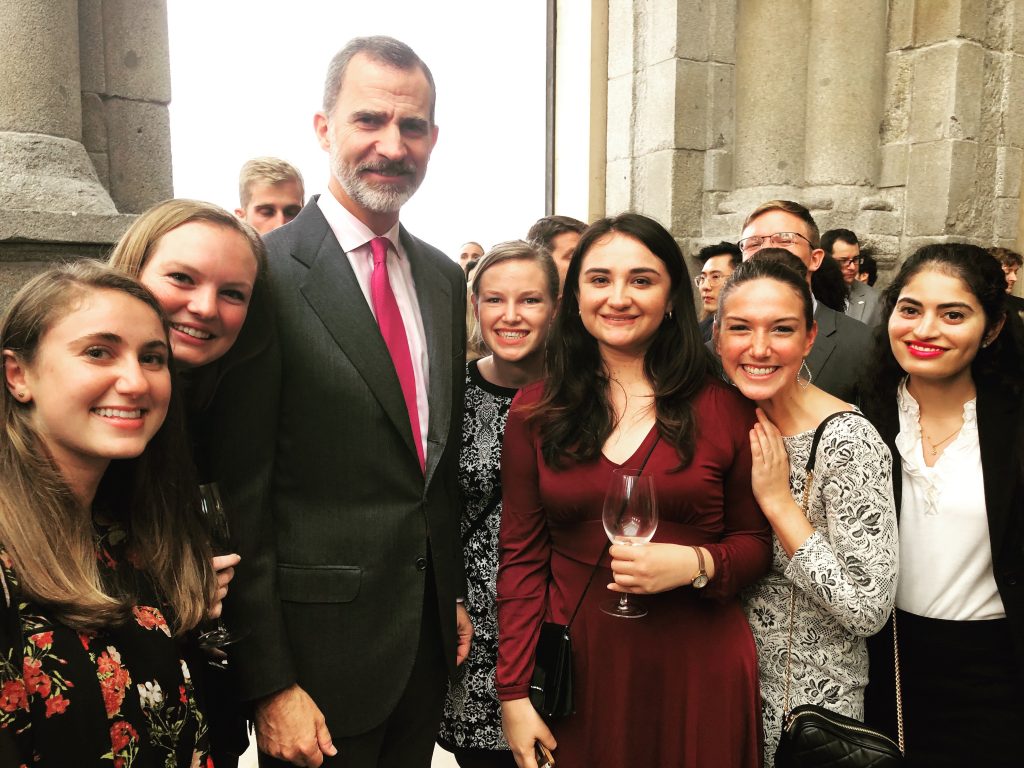Fulbright Chronicles, Volume 1, Number 2 (2022)
Author
Brenda Garcia Millan
Abstract

My Fulbright award was an English Teaching Assistant (ETA) fellowship in Madrid, Spain, where I coordinated a Global Classrooms (Model UN) project. Through its easy access to public transit and walkable neighborhoods, Madrid changed how I viewed sustainable urban development. This article reflects on those experiences and discusses how I continue promoting sustainability and climate action at the international and local level.
Keywords
Urban development • sustainable development goals • Spain • climate change • education
In 2018, I received a Fulbright English Teaching Assistant (ETA) fellowship to the Comunidad de Madrid. After some challenging years as a University of Oregon graduate student in rainy Eugene, learning about my imminent move to sunny Spain felt like every sacrifice had built up to that one moment. However, when I learned that I would teach at a high school located in Alcorcón—a municipality located on the outskirts of Spain’s capital—I was concerned about how I would travel to work every day. Once I arrived in Spain that fall, it became clear that living in the big city and commuting to work would be a completely different experience than what most Americans are accustomed to.
On my second day in Madrid, I was fortunate to find a piso (apartment) across the street from Atocha. Atocha is Madrid’s largest railway station, serving ten cercanías (commuter trains) lines, high-speed trains, Madrid’s metro line 1, more than 20 local bus routes, and many more intercity buses. During my first visit to Atocha I was struck by the fact that the station led in every direction, almost as if Atocha were at the center of the world—or at least the center of my new world.
For those who may not know, Atocha was at the center of the world’s attention during the terrorist attacks of March 11, 2004, when Al-Qaeda bombed commuter trains. Today, Atocha stands as one of the safest and most sustainable transit stations in Europe. Just across its marvelous doors, one finds a stunning 43,056 square foot tropical garden composed of 7,000 plants from 360 species from the Americas, Asia, and Australia. Walking by Atocha’s tropical garden became part of my daily train commute to Alcorcón, where I taught at Instituto Los Castillos.
Bringing the Sustainable Development Goals to the Classroom
As a teacher’s assistant, I coordinated a Global Classrooms (Model United Nations) project in which I introduced students to the United Nations Sustainable Development Goals (SDGs). This project was the first of its kind at Los Castillos. As the first Fulbrighter to be hosted by my school, I helped establish the foundations of the program, setting the stage for future Fulbright grantees.
By teaching about the SDGs to young students, I sparked curiosity among students about global efforts to achieve a more sustainable, just, and greener world. To discuss solutions to achieve the SDGs, I prepared lesson plans on difficult topics related to the inequities that impact the quality of life of people worldwide, particularly women, who are most vulnerable to poverty. Despite their age, I found Spanish students incredibly open-minded and mature. I frequently led talks concerning gendered violence, racism, and discrimination against migrants—all of which would make many American adults uncomfortable— but my pupils were always active and engaged in these discussions.
This (Fulbright) experience influenced my way of thinking about the role of youth as agents of change who can mobilize to promote the United Nations Sustainable Development Goals and improve the lives of people and the future of our planet.
By the end of the Global Classrooms project, my students produced research papers on the Sustainable Development Goal number five, Gender Equality, in which they investigated how different countries address the major challenges faced by women. They also participated in a United Nations Human Rights Council mock conference with hundreds of other students from the Comunidad de Madrid. This experience influenced my way of thinking about the role of youth as agents of change who can mobilize to promote the SDGs and improve the lives of people and the future of our planet.
After my return to the United States, I was invited by a fellow Fulbrighter from Spain to join the Global Schools Program Research Team. Global Schools is an initiative of the United Nations Sustainable Development Solutions Network supporting United Nation Educational, Scientific, and Cultural Organization’s (UNESCO) Global Action Program on Education for Sustainable Development (ESD). As a project officer, I develop tools and resources to support education systems and educators globally in implementing the SDGs in the classroom, continuing the work I did as a Fulbrighter in Madrid. I’ve also helped prepare reports about the localization of the SDGs in national curricula in developing countries and a guide for educators on best practices for ESD implementation. As of 2021, the Global Schools Program has expanded from 937 to 1,270 schools in 89 countries and territories worldwide.
Advancing Climate Solutions in San Diego
Today, the long-term impact of my time as a Fulbright scholar in Madrid is reflected in my work as a Research and Policy Analyst at a San Diego-based non-profit called Climate Action Campaign (CAC). CAC’s primary goal is to advance policies and programs to help San Diego and Orange County stop the climate crisis by reducing carbon emissions. We do our work through an equity lens reflected in our five policy priorities: 100% clean energy, bikeable, walkable neighborhoods, all-electric homes, world-class transit, and climate resiliency.
As I discussed earlier, during my time in Madrid, I was a frequent public transit user who had an easy and accessible commute to work. Living in Madrid made me realize that the transportation sector is key to sustainable urban development. For example, between 2018 and 2019, I witnessed the establishment of measures such as Madrid Central, which was a historic step toward a car-free city center to clear air pollution and improve pedestrian safety.
Since joining CAC in 2021, I have devoted my efforts to combating San Diego’s car dependency, which contributes to heavy air pollution and GHG emissions that exacerbate climate change. One major accomplishment I have had during this time has been publishing a research report outlining alternatives to sprawl development, which is the outward expansion of low-density residential and commercial development, promoting car-dependent communities.
For decades, sprawl has proven to be unsustainable and damaging in San Diego and throughout California. Urban sprawl leads to increased energy use, pollution, traffic congestion, and the destruction of the natural environment. My research reports address these issues and includes key recommendations for cities in San Diego County on how to build sustainable communities with walkable neighborhoods and public transit near housing and jobs.
In addition to land use and transportation policy, my work centers on advancing sustainable climate solutions through local initiatives, including advocating for the development of zero carbon Climate Action Plans (CAPs). CAPs are frameworks used by local governments to set ambitious carbon emission reduction targets. This year, I co-authored my organization’s 5th Edition Climate Action Plan Report Card to offer an assessment of San Diego’s region’s climate policy planning and implementation. To create this report, I evaluated thirteen regional CAPs along with cities’ annual monitoring reports. As a result of this evaluation, I provided cities with best practices in climate equity, clean energy, food systems, transportation and land use, and the green economy.
Local Climate Action and Looking Forward
As I continue to grow in my career as a researcher and policy analyst, I hope to advance solutions that lead to a zero carbon San Diego. Cities are at the frontline of the climate crisis, and we need coordinated local action to build safe and sustainable communities. As a member of the Fulbright Association, I look forward to establishing partnerships with fellow Fulbrighters who share similar interests and experiences. Currently, my goal is to join the Board of Directors of the recently established Fulbright Spain Interest Group. In the future, I hope to return to Spain to research sustainable development policies and initiatives to build more sustainable and equitable cities.
Notes
- For more details on the Global Schools Program see the Global Schools Annual Report 2021 from https://www.globalschoolsprogram.org/annualreport
- A detailed analysis of sprawl development can be found in Climate Action Campaign’s report Solving Sprawl: Building Housing for a Sustainable and Equitable San Diego https://www.climateactioncampaign.org/sprawlreport
- To learn more about the impact and status of Climate Action Plans in the San Diego region see Climate Action Campaign’s 5th Edition CAP Report Card https://www.climateactioncampaign.org/report-card

Biography
Brenda Garcia Millan is a Research and Policy Analyst at Climate Action Campaign, a public policy nonprofit organization based in San Diego, California. In addition to her work at Climate Action Campaign, Brenda serves as a Project Officer at Global Schools Program, an initiative by the UN Sustainable Development Solutions Network (SDSN) Youth. In 2018, she was a Fulbright Fellow in Madrid, Spain. Brenda has a Masters’ degree in Global Studies from University of Oregon. She can be reached at brenda.garciamillan@gmail.com
